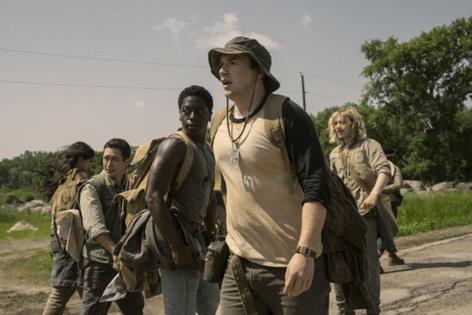Movie review: 'The Long Walk' lets talented young cast stretch their legs
Published in Entertainment News
Things are very, very grim in “The Long Walk,” the adaptation of Stephen King’s 1979 novel (published under the pseudonym Richard Bachman), which is essentially “The Hunger Games” for teenage boys, or “They Shoot Horses, Don’t They?” for Gen Z— texts that traffic in the extreme outcomes of American capitalism, a force that rots from within, ripe for dissection for nearly a century.
“The Long Walk” is the first novel King wrote, which he started around 1966, eight years before his first book, “Carrie,” was published. The plot is simple, and incredibly dark: in a dystopian United States under totalitarian rule, 100 teenage boys are selected from a lottery to participate in a contest that only one can win — whoever survives a multiday, hundreds-of-miles-long-walk wins, and is rewarded with a hefty monetary prize. Walk until there’s only one left, slow down and receive a warning, after three warnings, a bullet in the head. The broadcast of this walk is intended to inspire workers to increase their productivity.
Cooper Hoffman stars as Ray Garraty, one of the hearts of the film. The other heart is Pete McVries (David Jonsson). The two young men become fast friends, and then brothers, on the walk, during which they endure all manner of physical, psychic, emotional, spiritual and mental degradation, along with the other boys whom they befriend, support and battle on the asphalt.
“The Long Walk” is directed by Francis Lawrence, who has helmed most of “The Hunger Games” films and prequels, and is written by JT Mollner, who wrote and directed 2024’s pop noir “Strange Darling.” As in “The Hunger Games” (both the books by Suzanne Collins and the film adaptations) and “They Shoot Horses, Don’t They?” (a 1935 novel about Depression-era dance marathons by Horace McCoy, and a 1969 Oscar-winning film by Sydney Pollack), “The Long Walk” tackles what it means for young people to volunteer for organized barbarism out of desperate need, and the consumption of their destruction as entertainment.
There are two audiences at play here, the ones within the films themselves, like those at a gladiator arena, uncritically taking in this death and bloodshed, then there’s us, the audiences of these films that deliver scathing critique about the abuses of power that lead to young people, hoping to earn a way out of their circumstances, being chewed up and spit out for hungry viewers. They are exceedingly bleak films, and “The Long Walk” is especially so, true to the source material.
Lawrence hasn’t quite made the important distinction between these two kinds of audiences though. We never see the broadcast or who is actually watching this walk, aside from a few cutaways to bored locals on the side of the road. But before the title even flashes on screen, we are granted the disturbingly detailed view of a bullet ripping through the face of a young boy. It signals to the participants on the walk that they’re not to toy with the warnings, and to us watching that this is a film that pulls no punches when it comes to graphic content (in many different ways).
But does it implicate us, as well, in this morbid voyeurism? What does it mean to see a child’s head exploded by heavy artillery in a fictional film, when that’s something that regularly happens in schools in America? Pete mentions to Ray that they’ll have to get used to it, and Ray responds that’s what he’s worried about. It sounds like the conversation every time a mass shooting happens in America, and while it’s a profound piece of dialogue, it’s just that.
Mollner and Lawrence keep the story locked on the boys, and don’t elaborate on this desensitizing idea further, continuing to show us the dehumanizing torture they endure. The emotional heft comes from what they learn about each other, especially Pete’s ability to look at life with genuine enthusiasm and beauty, a lesson he imparts on Ray, who has arrived with vengeance on his mind for the cruel orchestrator of their pain, the Major (Mark Hamill), and a broken heart for his mother (Judy Greer). Ray has the critical thinking down, but his journey is an emotional one, learning to see the world through Pete’s eyes, but never putting his natural leadership abilities to use in organizing against their oppression.
It’s a stunning showcase for the acting talents of the young ensemble, which also includes Ben Wang, Garrett Wareing, Tut Nyuot, Charlie Plummer and Joshua Odjick. Lawrence is sparing in his style, the image desaturated like a vintage photograph, locating this fable in an unspecified future and past. Executed and performed with precision, the focus is on the relationships, but not breaking the system itself. The message of “The Long Walk” is muddled, at once hopeful and despairing.
———
'THE LONG WALK'
3 stars (out of 4)
MPA rating: R (for strong bloody violence, grisly images, suicide, pervasive language, and sexual references)
Running time: 1:48
How to watch: In theaters Sept. 12
———
©2025 Tribune Content Agency, LLC













Comments